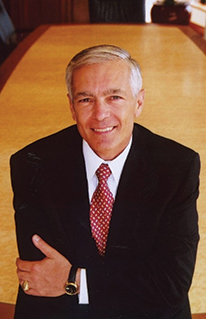Biofuels, Light Bulbs and Why Quitting is Not an Option

May 15, 2013
BY retired Gen. Wesley Clark
News reports have shown that in recent years major oil companies like Chevron and Exxon have “given up” on biofuels. The consensus is that the work to develop biofuels is too difficult for them to figure out and that it would be too costly and not profitable enough. Really, are they serious? Moreover, do they expect Americans to believe quitting is the best option for our future?
After just a few years of effort and little commitment to research and development, they just decide that, well, it’s not easy, so let’s just give up. What if Thomas Edison had given up on the light bulb? Where would we be now? Sitting in the dark.
Persistence and the understanding that there was a better way to provide light drove Edison to make an inspired thought a reality. It may have taken years and many others to perfect the light bulb, but persistence led the way to progress. Neither Edison, nor those who followed his footsteps, decided to give up.
It took years and countless trials to develop the bulb and filament technology. There were certainly critics and I am sure that the whale oil industry, who then supplied the fuel to oil lamps, was adamantly opposed to the idea. They didn’t want to become irrelevant, so they opposed it. But they could not stop it—today there is electric light everywhere.
Advertisement
Americans pride themselves on hard work and ingenuity. There is little doubt that we believe that the collective strength of our great nation is derived from the amazing people it is comprised of, like Edison and other great visionaries and inventors. We have always been a forward-thinking country that plays the long game, looking for solutions to the problems we currently face and also ones we anticipate will arise in the future.
Enter 21st century energy. While we are dangerously dependent on fossil fuels, many pioneers have recognized there are many viable components to a more diverse energy portfolio, and one answer that can play a significant role is renewable fuels. They are sustainable, unlike the current carbon-based fossil fuels we rely on today.
This industry started small, with a few pioneers and has grown tremendously over the past few decades. It has grown to become self-sufficient from government subsidies and more efficient in terms of water usage and power output. And it is infinitely renewable—just some sun and rain to perpetually grow the feedstock.
However, the success of renewable fuels threatens the bottom line and market share of oil companies, such as Exxon and Chevron. While these companies initially promoted these fuels, they could not make the same profits and also found that drilling for oil was easier than advancing technology of biofuels and new infrastructure for them to secure our energy future.
So, not only have these companies given up on their research into renewable biofuels, but they have actively engaged in public affairs campaigns and legal and regulatory hurdles to block any future progress. According to one new report, a return of 5 percent wasn't enough for companies used to margins triple that. They are putting corporate profits ahead of energy security and they simply do not care.
Advertisement
Just imagine where we would be if a 19th century inventor were as timid as a 21st century corporation. Biofuels are sustainable and are cleaner and better for our environment. As we continue to learn of the harmful emissions that traditional fossil fuels generate while being burned to fuel our vehicles, we must reaffirm our dedication to producing cleaner fuels that are better for the air we breathe and also protect the environment for both current and future generations.
If great inventors, such as Edison, could see the progress we have made, they would be amazed. Furthermore, they would be inspired by the current pioneers—those perfecting first-generation biofuels and developing next-generation fuels from diverse feedstocks to secure our energy needs for the future while serving a critical role in preserving our environment.
On the other hand, companies like Exxon and Chevron—those who not only gave up on biofuels production and research but fought against progress—would certainly disappoint the great inventors. Their stubborn actions to accept a failed status quo goes against the very spirit of American ingenuity and progress.
It truly is a shame that 21st century corporations give up on meaningful advancements and fight against progress just to keep those deep pockets full of excessive profits at the expense of progress and our nation.
Author: retired Gen. Wesley Clark
Co-chair of the Growth Energy Board of Directors
202-545-4000
info@growthenergy.org
Related Stories
The U.S. EPA on July 8 hosted virtual public hearing to gather input on the agency’s recently released proposed rule to set 2026 and 2027 RFS RVOs. Members of the biofuel industry were among those to offer testimony during the event.
The USDA’s Risk Management Agency is implementing multiple changes to the Camelina pilot insurance program for the 2026 and succeeding crop years. The changes will expand coverage options and provide greater flexibility for producers.
EcoCeres Inc. has signed a multi-year agreement to supply British Airways with sustainable aviation fuel (SAF). The fuel will be produced from 100% waste-based biomass feedstock, such as used cooking oil (UCO).
President Trump on July 4 signed the “One Big Beautiful Bill Act.” The legislation extends and updates the 45Z credit and revives a tax credit benefiting small biodiesel producers but repeals several other bioenergy-related tax incentives.
CARB on June 27 announced amendments to the state’s LCFS regulations will take effect beginning on July 1. The amended regulations were approved by the agency in November 2024, but implementation was delayed due to regulatory clarity issues.
Upcoming Events










